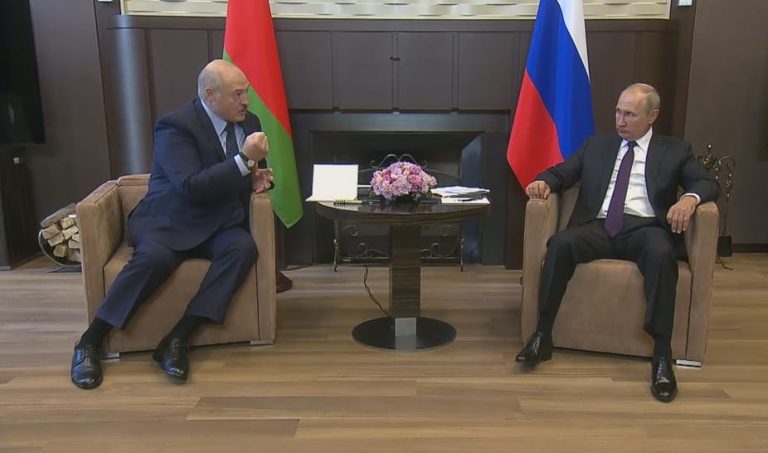Belarus fell into dependence on Russia. Moscow controls the situation in Minsk more and more often. Western European countries’ pressure on Lukashenko has no sense as the Kremlin determines and runs the situation in the country.
At Sochi meetings between President Putin and his Belarusian counterpart held last September and this February, the latter expressed support for Lukashenko’s strategy to amend the Constitution of the Republic of Belarus. The Kremlin expects the Belarusian parliament to get more authority, however, the repressive machine will rest in the hands of Lukashenko controlled by Moscow in exchange of support and balancing the consequences of the EU’s sanctions.
Lukashenko visited Sochi to convince Putin of having the situation in Belarus under control; it means that the transfer of power can be extended for the next 5 years. The Kremlin has publicly agreed to such an assessment, but the issue of the transfer of power in Belarus has been postponed rather than been taken off the table.
As of Alexander Lukashenko, Russia doesn’t pursue the aim to remove him; the Kremlin seeks to replace him with the man who would play to Moscow’s script. This is the reason why the Putin Administration is looking for a substitution for Lukashenko.
Moscow is skeptical about the Sochi meetings. According to available information, the Kremlin expresses concern about the President of Belarus’ six-month ignorance of Moscow’s signal to put the 2021 constitutional reform in place. The Putin Administration seeks the ways to respond to Minsk’s procrastination.
At the same time, Lukashenko takes granting Russian new credits to accomplish his undertakings to Moscow as the Kremlin’s approval of his actions; such present-day developments encourage the Belarus President to keep constitutional reform options open.
As of the Kremlin, it uses Lukashenko’s hands to transform Belarus into a part of the union state with an imaginary democracy but with an army that will dictate rules to this democracy at the same time.
Moscow is pushing Minsk to go into a republic with a military dictatorship. Lukashenko remains an unrecognized president in nominal terms, and the Kremlin-ordered military control all the processes in the country. The fact that Lukashenko has already given Russia the territory of Belarus to carry out the large-scale military maneuvers since the Cold War will facilitate this transformation.
As for Russia, Lukashenko’s legitimacy guarantees Putin’s own legitimacy. Its main goal is to suppress democratic revolution in the world and prevent it in Russia so that they could implement the lifelong Soviet model of regime government. That is why Lukashenko’s victory in color revolution in Belarus is so important for the Kremlin.
By fueling protests in Belarus Russia sought more than to break down Lukashenko’s ability to issue ultimatums to Putin and implement ‘Anschluss’-style process. In this manner it wanted to demonstrate the whole world how failed color revolutions in the Kremlin’s sphere of influence are.
Today’s Belarus is a country with limited international sovereignty. Its entire economy is built on Moscow’s support. As long as Putin finances Belarusian security forces, Lukashenko can feel safe and secure from civil protests.
By flirting with the West, Lukashenko tried to blackmail Moscow and make the latter give more financial aid to Minsk, provide significant trade preferences, and so on. Therefore, as soon as Putin accepted his terms, Lukashenko’s maneuvers with the West took another twist. The events of recent months show that Lukashenko has lost maneuver skills, and his president’s position requires allegiance to Putin. However, situation change in Belarus will not allow Lukashenko to argue with Putin anymore.
In the Union State, Moscow sees Belarus as a subsidized region. In the long run, Putin is going to tie Belarus economically. The latest example is the redirection of Belarusian oil export routes from Lithuanian and Latvian ports to Russian ones.
Moscow is increasing its influence in Belarus and actively using Belarusian businessmen from Lukashenko’s entourage, as well Putin-close Russian oligarchs dealing with financing quasi-state projects. The sanctions triggered appearing cost-effective schemes to use Belarus as a transit country for supplying sanctioned products from and to Russia. The largest trade channels are controlled by businessmen from Lukashenko’s team.
Russia’s interests realized in Belarus mainly depend on effective information operations implementability. It requires financial resources and influence groups in the target countries. Belarus serves as a perfect example on the Kremlin’s tactics to create and support a pro-Russian lobby.
Moscow is extremely annoyed by Lukashenko. That is why Putin will try to remove him at the next opportunity. Despite psychological antipathy, the Lukashenko-Putin relationship will be built on equal interests.
In the light of last autumn events the Kremlin has reconsidered its plans for Belarus’ quick accession. The Minsk authorities failed to suppress the protests completely. The prospect of a quick accession will endanger the Kremlin with protest movement to Russia. At the same time, the Kremlin believes in real prospects to integrate Russia and Belarus only in case of Lukashenko step down from the presidency. As long as Lukashenko is in power, he will sabotage and delay the integration process because of the fear to lose financial and political control since integration under Putin’s scenario involves transfer of most of the power to supranational bodies. So far Lukashenko is not yet ready for that.





